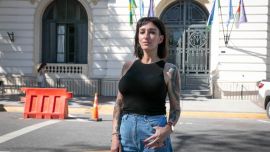There’s no slowing Pacho O’Donnell. “I’m a passionate person about what I believe in and do. I’m a classic Scorpio,” says the 83-year-old.
It is hard to contradict him – O’Donnell has been a politician, historian, lawmaker, artist, essayist, playwright and author. And then some.
Now, the author has become a lucid thinker about old age and how we experience it, both those in that stage of life and those of us who live with it.
This Sunday September 22, he will make a presentation of his best-selling book on the subject, La nueva vejez (“The New Old Age”), in what might be described as a “live” version, featuring appearances by singer Magdalena León and guitarist Samy Mielgo.
“I’ve always been convinced that life should be lived intensely. From a very young age, I’ve been clear about the idea of death, the finitude of life. That’s been an important motor for me,” said O’Donnell in an interview.
“I don’t believe it’s a virtue, but I’ve never been able to nap, because I feel it’s a waste of time,” he added, addressing the many things he has done.
““I’ve always had the notion of not wasting time. I’ve changed the reasons why I’ve lived intensely. I’ve been transforming myself. I’ve been fond of playing with all [the] toys,” said O’Donnell.
“I’ve gone through politics, literature, theatre, art, essays…. this responds to an idea that one ought to be very loyal to one’s desires.
“It’s like the parable of the talents in Matthew’s gospel: distributing talents among servants, and when they return, he asks them what they have done with their talents. Two had increased them, taken risks, and one buried them out of prudence, to give them back intact on his return.
“That is the equivalent of walking the walk, thinking what one should think, and that becomes clear in old age, which is the time for balance, and that could make one dramatic,” said the veteran writer and thinker.
Is there something that moves the elderly? Especially someone like you, who has thought about it perhaps like very few people in the present time?
Old age today is the longest stage of our lives, when circumstances permit. I’ve been old for 20 years. That’s a long time – it’s not like the old age of yore, retiring and sitting around waiting for death. Today is a part of life that needs to be filled, and you need to know things.
I’m not a healthy old man, I have my fancies. That’s a given, that’s old age. Old age is a stage to pay your debts with yourself. It’s when you can do what you haven’t been able to, what you didn’t want, what you didn’t dare do, because your kids’ school fee wouldn’t allow it, because you had to pay for your gas bill.
It is said that when you enter your final years you regret more what you haven’t done than what you’ve done. So, old age can be a very rich stage to find yourself. Adding completeness and dignity to life.
What have you learnt about having plays, texts, essays and so much more in your life?
For me to tell, for example, history from the place of a historian. I’m not a mining historian going through archives, but I have rather been based on my master, Pepé Rosa, a history teller.
Rosa assumed the mystery in a great story. Argentine history is a wonderful tale. In my plays, my novels, I find I like to tell stories the way I’ve done in the historical field.
Is there something you’ve discovered about yourself by telling stories? Something you didn’t suspect was there?
It rings a bell in terms of what we were talking about. What is “yourself” in old age? Which debts did I pay to myself in my old age? A debt with my body, for example.
I found my body at 64. I was diagnosed with heart failure and the doctor said: “Go work out a bit, to strengthen the healthy parts of your heart.” And I got hooked on working out, something which at one point went much more viral than I would have wanted, with photos of me working out.
Old people were not supposed to take photos of themselves working out, young people are, but not old people. Old people, according to prejudice, are ugly.
At the show at Teatro Astros I talk about prejudice about old age, it’s experienced like a tragedy. It’s a challenge. It’s a stage which has its limitations, but which one can live intensely, change the course of your life, do things you hadn’t done before. It can be a creative, dynamic and even erotic stage.
Old people are not supposed to have sex. And there can be sex until the end of our days. It’s a different type of sex, but it is sex.
What do we owe as a society to our elderly at our present time?
Not having such a dark view of old age. Knowing that old age can be a happy stage. For example, the relationship with older people gets complicated when you have a tragic relationship with old age, because you see what you’re going to be.
In Diario de la guerra del cerdo, [Adolfo] Bioy Casares writes about young people who go out and kill old people. Bioy Casares said that young people saw and hated old people, the old people they would become. That is so. The issue of ‘old versus young’ is that it shows that we’re all going to be old, even if we imagine ourselves with Botox or acrylate or rejuvenating treatments to be able to prevent the passage of time.
If we’re lucky, we’re all going to be old.
It’s very easy to listen to ‘the young’ today based on the speed and shallowness of social networks.
It’s a society centred on the young. Old people are supposedly ugly, and that has to do with the fact that beauty is moulded on a young conception of beauty. We live in a consumer society, where those who can consume are young people and adults.
Old people are yesterday’s news. On television there are no ads of cars, trips, complicated appliances aimed at the elderly. We get glue for dentures or collagen for joints.
The extremely low capacity to consume is an important basis for the preconceptions towards old age.
Which prejudices did you once have?
All kinds, that old age is a time when you’re depressed, sickly, unproductive all the time. That’s a cultural imposition. Culturally it was a fact that us old people are like that. The difficulty of saying the word “old” adds to part of the prejudice. “Old” is not a word that is easy to say, because of the prejudice.
I’ve been old for a while, and I’ve written several plays. Currently there is a play of mine, Escarabajos (“Beetles”), at the Cultural Centre for Cooperation. I have a history book with publishing house Sudamericana, which comes out March next year. I’m working on this story about old age, redeeming old age as a stage which can be many things.
At 83 years old, sickly, I understand the losses imposed by old age. It’s important to give key guidelines: do not be alone.
Sometimes it’s inevitable. To old people it’s important to join groups. Argentina is a very generous country in that regard. There are many groups in neighbourhood clubs, unions.
It’s important for old people to join that. It provides a better old age, and it’s even been proven that it prolongs your life. Staying fit: for an old person not to work out, it’s like smoking, it’s suicide.























Comments